Irrigation - Lever for agricultural development
During his lifetime, President Ho Chi Minh always valued farmers and considered agricultural development an objective necessity, the basis for developing other economic sectors. He once said "If our farmers are rich, our country will be rich, if our agriculture is prosperous, our country will be prosperous", and at the same time affirmed "Agriculture must be developed comprehensively".
In Ninh Binh, on March 15, 1959, Uncle Ho came to encourage and motivate digging ditches and leading water to fight drought in Cham field, Khanh Cu commune, Yen Khanh district. On the way from Khanh Cu commune to Ninh Binh town, Uncle Ho also went down to bail water with farmers in Ninh Son commune at the foot of Canh Dieu mountain (now part of Ninh Binh city). Uncle Ho advised the farmers: "Water must be enough, fertilizer must be abundant/ Plow deeply, good seeds, plant more evenly/ Don't forget to control pests and rats/ Improve farming tools, which is the foundation of farming/ Manage fields and fields with effort/ Eight things are complete, rice and cotton are full in granaries". Taking Uncle Ho's teachings as a guideline, Ninh Binh's agricultural sector has persistently applied scientific and technical advances in production, building a modern, efficient and environmentally friendly agriculture.
Comrade Dinh Van Khiem, Deputy Director of the Department of Agriculture and Rural Development, said: Imbued with and deeply remembering Uncle Ho's teachings, over the past 65 years, under the leadership of the Provincial Party Committee, People's Council, and Provincial People's Committee, the Ninh Binh Agriculture sector has made many efforts, constantly promoting the strength of solidarity and creativity to advise on investment in the development of the irrigation sector, truly a lever for agricultural production, building ecological agriculture, modern countryside, and civilized farmers.
With the province's diverse terrain (mountainous, semi-mountainous, lowland, plain and coastal areas) and a dense river system, interwoven with a complex water regime, if irrigation work is not well implemented, it will be difficult to proactively respond to unusual weather conditions. Identifying irrigation as a lever for agricultural economic development; implementing Uncle Ho's advice: "...must overcome natural disasters, droughts, storms and floods to produce more and more, bringing happiness to the people", over the past many years, the provincial Department of Agriculture has actively and proactively advised the province to pay attention to investing in the irrigation sector in a systematic, scientific and long-term strategic manner.
Accordingly, in addition to launching movements to build internal irrigation to ensure irrigation for production, the province has mobilized resources to invest in upgrading key dykes and irrigation works. Over the past years, the Central Government and the province have invested thousands of billions of VND to build and upgrade irrigation works in the province, such as sea dykes, river dykes, spillways, pumping stations, locks, etc. Up to now, the province has built a solid and modern irrigation infrastructure system, with a total length of dykes of over 424 km. Of which, there is 1 level II dyke, 8 level III dykes, 5 level IV dykes and 20 level V dykes, passing through 8 districts and cities. The whole province has 46 lakes and dams, with a total capacity of over 43 million m3, ensuring irrigation and drainage for over 8,575 hectares of cultivated land.
The investment in irrigation and flood prevention infrastructure not only creates more strength and enhances the capacity to prevent and mitigate natural disasters, but also basically meets multi-purpose requirements, which are: serving production, preventing natural disasters, serving people's lives, combining traffic and ensuring security and national defense. A clear proof of Ninh Binh's irrigation system is that it has experienced and overcome the historic floods of 2017 and most recently the flood that occurred in September 2024.
From traditional farming to smart agriculture
Deputy Director of the Department of Agriculture and Rural Development Dinh Van Khiem said: Following Uncle Ho's teachings on the production sector, especially rice production, since the 1960s, Ninh Binh has introduced new rice varieties into production such as dwarf buffalo leg, Hai Phong shrimp variety... Along with that, the province has promoted the movement of making manure, green manure, water fern... From the movement, the province's rice productivity has been constantly improved and increased, from 2 tons/ha to 5 tons/ha/crop.
Not stopping there, in the 1980s, Ninh Binh boldly introduced high-yield hybrid rice varieties into production, such as Nhi Uu and Bac Uu lines. At the same time, applying technical advances to production has increased rice productivity to 7-8 tons/ha/crop, contributing with the whole country to help our country overcome the period of food shortage and become one of the leading rice exporting countries in the world.
With the development of science and technology and the development of socio-economy, the province's agricultural thinking has also changed over time. Ninh Binh has transformed from hybrid rice cultivation to pure rice, high-quality specialty rice. Introducing Bac Thom No. 7, LT2, Tam and sticky rice varieties into production; up to now, high-quality specialty varieties have accounted for 80% of the structure. Along with that, implementing land consolidation, plot exchange, renovating embankments, utilizing by-products, using organic fertilizers, bringing mechanization into production and production according to the value chain, contributing to the stable and sustainable development of Ninh Binh's agricultural economy.
In addition to food crops, vegetables and fruit trees have also developed strongly, forming specialized areas of high economic value. Livestock has also developed steadily and become the main production industry, meeting consumer demand, creating commodity products, and increasing farmers' income. Agricultural and forestry production has changed the crop structure, crop and livestock structure; gradually shifting from self-sufficiency to commodity production, the agricultural and forestry industry has increasingly developed and expanded, and people's lives have been significantly improved.
Deputy Director of the Department of Agriculture and Rural Development Dinh Van Khiem added: The achievements have affirmed the position of Ninh Binh agriculture. However, facing the challenges of climate change conditions along with the development orientation to 2030 and vision to 2050, the province's agricultural sector needs to continue to change its thinking more strongly. In particular, for the irrigation sector, it is necessary to focus on upgrading the dike system, gradually eliminating the flood diversion and flood slowing areas of Nho Quan and Gia Vien, creating a premise for socio-economic development of this region. Investing in a system of irrigation works to meet the needs of production and people's lives, especially flood drainage not only for agricultural production but also for residential areas, urban areas, and industrial clusters. At the same time, continue to invest in renovating the internal irrigation system to meet the needs of emission-reducing cultivation, towards carbon credit exchange in agricultural production.
For agricultural production, it is necessary to promote the application of high technology in production, digital transformation in agriculture, thereby improving productivity, product quality and creating added value. In addition, planning high-yield and high-quality production areas, especially rice areas, investing in supporting organic production and emission-reducing rice cultivation. Developing key products and specialty products of the province in the direction of organic, multi-value circulation suitable for the 5 economic ecological sub-regions of the province, in which special priority is given to specialty products, OCOP products of the province, serving tourism... Only then will the province's agricultural production increasingly develop, bringing happiness to the people as beloved Uncle Ho wished.
Article and photos: Mai Lan
Source: https://baoninhbinh.org.vn/65-nam-thuc-hien-loi-bac-nong-nghiep-ninh-binh-doi-moi-vuon/d20241017065817332.htm


![[Photo] General Secretary To Lam attends the conference to review 10 years of implementing Directive No. 05 of the Politburo and evaluate the results of implementing Regulation No. 09 of the Central Public Security Party Committee.](https://vphoto.vietnam.vn/thumb/1200x675/vietnam/resource/IMAGE/2025/5/19/2f44458c655a4403acd7929dbbfa5039)

![[Photo] President Luong Cuong presents the 40-year Party membership badge to Chief of the Office of the President Le Khanh Hai](https://vphoto.vietnam.vn/thumb/1200x675/vietnam/resource/IMAGE/2025/5/19/a22bc55dd7bf4a2ab7e3958d32282c15)

![[Photo] Close-up of Tang Long Bridge, Thu Duc City after repairing rutting](https://vphoto.vietnam.vn/thumb/1200x675/vietnam/resource/IMAGE/2025/5/19/086736d9d11f43198f5bd8d78df9bd41)
![[Photo] Panorama of the Opening Ceremony of the 43rd Nhan Dan Newspaper National Table Tennis Championship](https://vphoto.vietnam.vn/thumb/1200x675/vietnam/resource/IMAGE/2025/5/19/5e22950340b941309280448198bcf1d9)
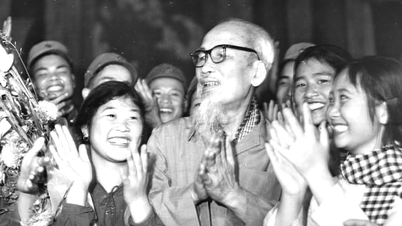

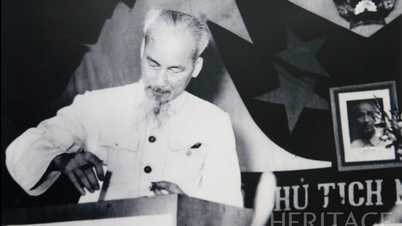

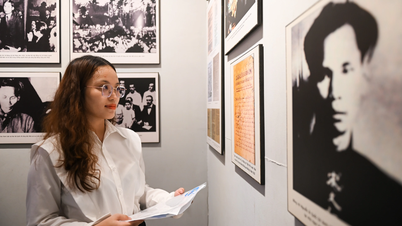





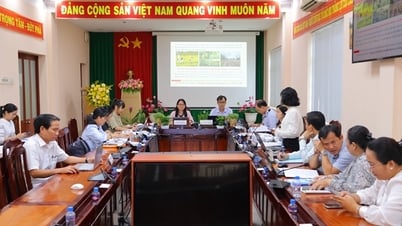
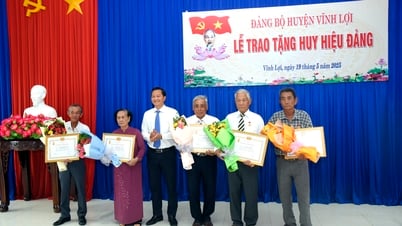
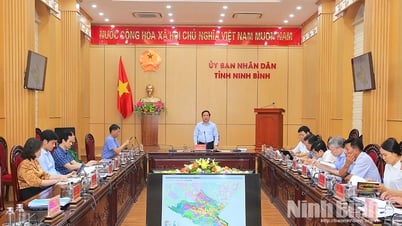

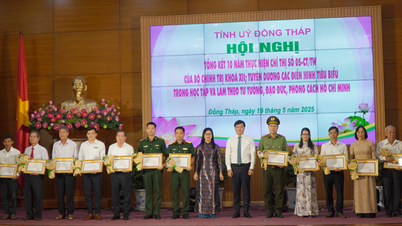
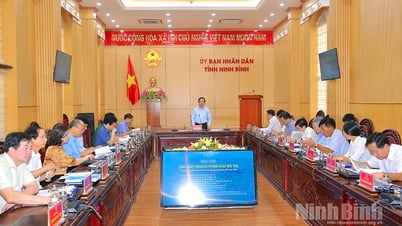
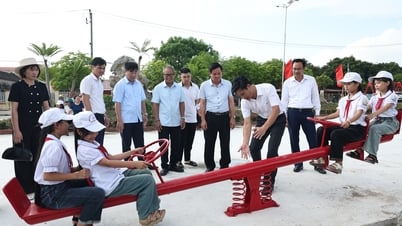






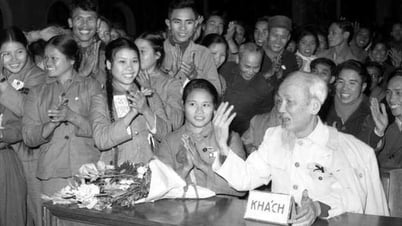



![[Photo] Prime Minister Pham Minh Chinh inspects the progress of the National Exhibition and Fair Center project](https://vphoto.vietnam.vn/thumb/1200x675/vietnam/resource/IMAGE/2025/5/19/35189ac8807140d897ad2b7d2583fbae)












































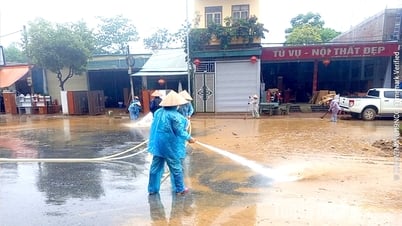

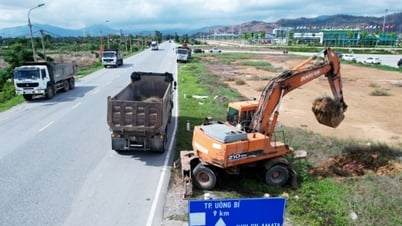

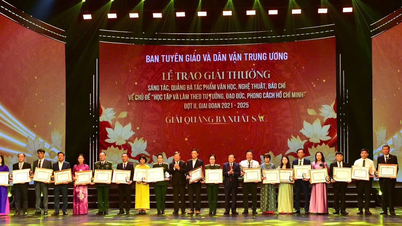







![[VIDEO] - Enhancing the value of Quang Nam OCOP products through trade connections](https://vphoto.vietnam.vn/thumb/402x226/vietnam/resource/IMAGE/2025/5/17/5be5b5fff1f14914986fad159097a677)



Comment (0)